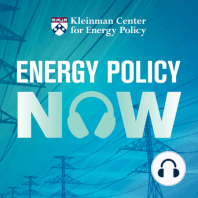25 min listen

Grid Operator PJM Talks Details of Energy Price Formation
Grid Operator PJM Talks Details of Energy Price Formation
ratings:
Length:
38 minutes
Released:
Dec 12, 2017
Format:
Podcast episode
Description
The Energy Department’s proposal to shore up coal and nuclear power plants could undermine the very foundations of competitive electricity markets. PJM Interconnection’s Stu Bresler, SVP for Operations and Markets, weighs in on DOE’s proposal, and explains PJM’s price formation alternative.
---
In October, Department of Energy secretary Rick Perry grabbed the attention of US competitive wholesale electricity markets when he issued an unusual request to the federal agency tasked with overseeing these markets, the Federal Energy Regulatory Commission. Perry’s proposal, known as the resiliency NOPR (or Notice of Proposed Rulemaking), asked that subsidies be paid to electricity generators that the Energy Department maintains are critical to the resilient operation of the electricity system.
More specifically, the subsidies would go to coal and nuclear power plants that can store a 90-day supply of fuel on-site. DOE maintains that this would ensure the plants’ continued operation in the event of fuel supply disruptions, for example during extreme weather. But the move to favor certain generators threatens to undermine competitive market principles that are the foundation of electricity markets. It could also disadvantage other forms of generation, mainly natural gas and renewables which, the Energy Secretary maintains, are less resilient.
PJM Interconnection, the largest competitive electricity market, has been outspoken in its concerns around the DOE proposal and the resiliency assumptions that underlie it.
In this episode, PJM’s Stu Bresler, Senior Vice President for Operations and Markets, presents PJM’s alternative proposal, which aims to reform the way prices are set in energy markets. Critically from PJM’s perspective, it’s price formation reforms would preserve market-based principles. PJM’s proposed plan would increase revenues to electric generators, ultimately benefitting the same endangered coal and nuclear plants that the DOE aims to support.
The Kleinman Center’s Christina Simeone, Director of Policy and External Affairs, who has written extensively on issues related to PJM, and handles the questioning.
Related Content
Initial Questions on PJM’s Price Formation Proposal http://kleinmanenergy.upenn.edu/blog/2017/11/21/initial-questions-pjm’s-price-formation-proposal
What the Heck is “Enhanced Price Formation” in PJM http://kleinmanenergy.upenn.edu/blog/2017/11/21/what-heck-“enhanced-price-formation”-pjm
PJM Governance http://kleinmanenergy.upenn.edu/paper/pjm-governance
Department of Energy Grid Resiliency Pricing Rule NOPR https://www.energy.gov/sites/prod/files/2017/09/f37/Notice%20of%20Proposed%20Rulemaking%20.pdf
Initial Comments of PJM Interconnection, L.L.C. on the United States Department of Energy Proposed Rule http://www.pjm.com/-/media/documents/ferc/filings/2017/20171023-rm-18-1-000.ashx
DOE Staff Report to the Secretary on Electricity Markets and Reliability https://energy.gov/downloads/download-staff-report-secretary-electricity-markets-and-reliability
---
In October, Department of Energy secretary Rick Perry grabbed the attention of US competitive wholesale electricity markets when he issued an unusual request to the federal agency tasked with overseeing these markets, the Federal Energy Regulatory Commission. Perry’s proposal, known as the resiliency NOPR (or Notice of Proposed Rulemaking), asked that subsidies be paid to electricity generators that the Energy Department maintains are critical to the resilient operation of the electricity system.
More specifically, the subsidies would go to coal and nuclear power plants that can store a 90-day supply of fuel on-site. DOE maintains that this would ensure the plants’ continued operation in the event of fuel supply disruptions, for example during extreme weather. But the move to favor certain generators threatens to undermine competitive market principles that are the foundation of electricity markets. It could also disadvantage other forms of generation, mainly natural gas and renewables which, the Energy Secretary maintains, are less resilient.
PJM Interconnection, the largest competitive electricity market, has been outspoken in its concerns around the DOE proposal and the resiliency assumptions that underlie it.
In this episode, PJM’s Stu Bresler, Senior Vice President for Operations and Markets, presents PJM’s alternative proposal, which aims to reform the way prices are set in energy markets. Critically from PJM’s perspective, it’s price formation reforms would preserve market-based principles. PJM’s proposed plan would increase revenues to electric generators, ultimately benefitting the same endangered coal and nuclear plants that the DOE aims to support.
The Kleinman Center’s Christina Simeone, Director of Policy and External Affairs, who has written extensively on issues related to PJM, and handles the questioning.
Related Content
Initial Questions on PJM’s Price Formation Proposal http://kleinmanenergy.upenn.edu/blog/2017/11/21/initial-questions-pjm’s-price-formation-proposal
What the Heck is “Enhanced Price Formation” in PJM http://kleinmanenergy.upenn.edu/blog/2017/11/21/what-heck-“enhanced-price-formation”-pjm
PJM Governance http://kleinmanenergy.upenn.edu/paper/pjm-governance
Department of Energy Grid Resiliency Pricing Rule NOPR https://www.energy.gov/sites/prod/files/2017/09/f37/Notice%20of%20Proposed%20Rulemaking%20.pdf
Initial Comments of PJM Interconnection, L.L.C. on the United States Department of Energy Proposed Rule http://www.pjm.com/-/media/documents/ferc/filings/2017/20171023-rm-18-1-000.ashx
DOE Staff Report to the Secretary on Electricity Markets and Reliability https://energy.gov/downloads/download-staff-report-secretary-electricity-markets-and-reliability
Released:
Dec 12, 2017
Format:
Podcast episode
Titles in the series (100)
The Energy Sector Confronts Cyber Risk by Energy Policy Now